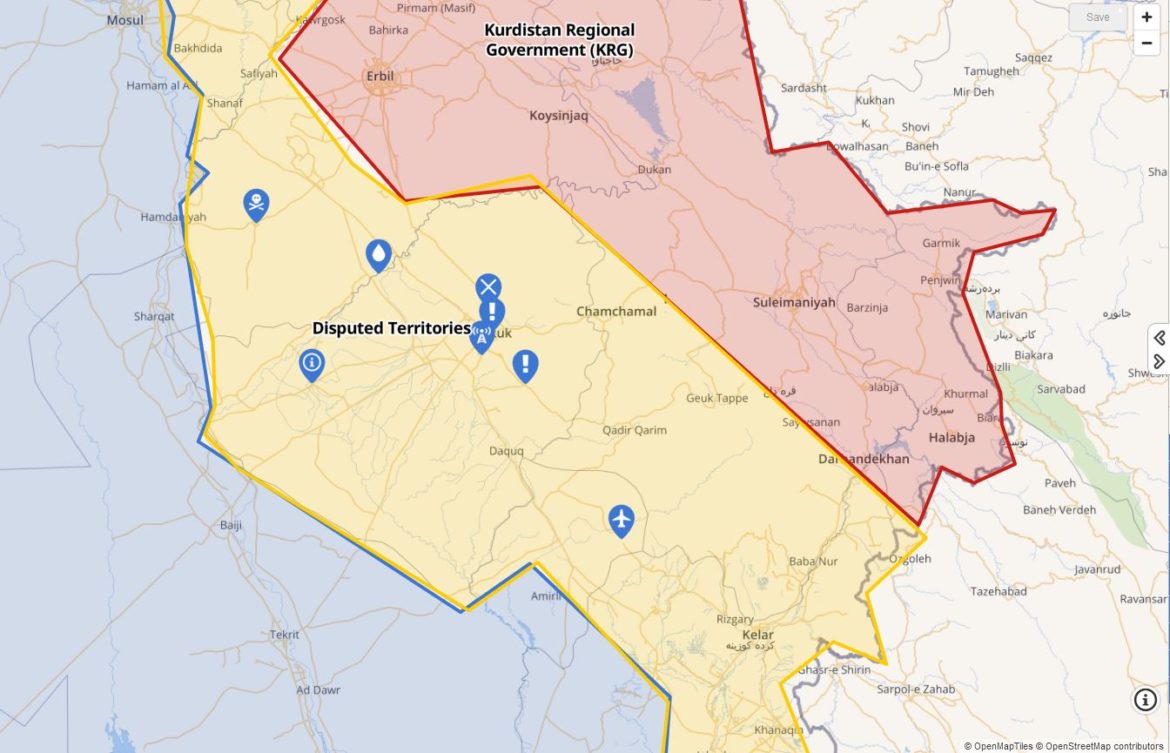1.4K
Kirkuk
- Due to the threat of ISIS (Da’esh) attacks in Kirkuk, all security forces in the province were on the highest emergency alert (C type) on Saturday. The security forces of police and army deployed thousands of troops with heavy weapons in Kirkuk city and the surrounding towns, blocking several roads leading to key government buildings. A leaked memo of police’s intelligence department warned of Da’esh attacks on government buildings, including Kirkuk’s governorate, the oil company, police headquarters, department of education, and the main jail. Further, on Tuesday June 1, security forces launched search and inspection in five neighborhoods and two main markets in Kirkuk’s downtown, hunting for Da’esh suspects. During the searching campaign, the security forces shut down both Khan Khurma and Hawija Terminal Market downtown for at least five hours, informing shop owners to close down for the day. 37 Da’esh suspects were arrested in 9 different raids across the province last week.
- Last week, Da’esh sleeper cells in the city of Kirkuk wrote the terror group’s slogan on the walls of three schools. The terror propaganda of “The Islamic State Exists” was written on walls of schools in Imam Qasim, Ronaki, and Shahidan neighborhoods. In the previous weeks, similar incidents were recorded on public buildings across the city.
- Kirkuk’s security forces found several 122mm rockets prepped for launch between Kirkuk Governorate’s Hasar and Darman villages. ISIS (Da’esh) and Iranian-backed militias remain the likely suspects regarding the attempted attack, as both have carried out an increasing number of attacks on Kurds and Peshmerga positions in Iraq’s “Disputed Territories,” which have been occupied by Iraqi forces and Iranian-backed militias since October 16, 2017.
- Due to the continued lack of basic services to Kirkuk citizens, administration, two local activists launched “time to leave” against the acting governor of Kirkuk Rakan Saed, the mayor of the city Falah Yaychi, and head of the municipality Faraidon Adel Waiss. Four anti-government protests were held last week as lack of electricity, water, and waste pickup has replaced the province as one of the worst places to live in the country. The social media campaign went viral among thousands of people sharing the campaign banner and calling the three top officials in the province to resign. Though launched by Kurds, many non-Kurds joined the campaign. Moreover, the Turkish-backed lawmaker and former head of the Turkmen Front, Arshad Salihi, warned of “An explosion of public anger and the outbreak of massive demonstrations” due to evident deterioration of services.
- A team of the “stabilization” program by the United Nations Development Programme (UNDP) visited Kirkuk and held meetings with its officials. On Wednesday, the stabilization team, which includes representatives of donor countries and international organizations, held a meeting in Baghdad with Iraq’s Secretary-General of the Council of Ministers Hamim al Gazi over Kirkuk’s stabilization efforts and the returns of the internally displaced people (IDP).
- According to Iraq’s oil minister’s monthly report, 3,060,913 barrels of oil were exported, grossing more than $199 million. The selling price per barrel averaged $65 produced from the five oil fields in 199 million. Kirkuk of Bai Hasan, Avana, Qubay Baba Jambour, and Khabaza.
- As pre-election fever slowly weighs in, disagreements among the three main Arab tribes of Kirkuk appear stronger. The Obaidi and Hamadan tribes are at odds with the Jabouri tribe over the number of candidates they have in the Arab coalition list. The two tribes accuse the Jabouris of having more of a role in the political scene. Iraq’s parliamentary election is set to be held on October 10, 2021.
Tuz Khurmatu
- At least eight Da’esh terrorists were killed and several of their hideouts were destroyed by a joint operation between Peshmerga and french forces, part of the US-led coalition near Zanadana (Zanana). The operation was backed by US airpower and lasted hours.
Makhmour
- In an interview with state-owned television TRT, Turkey’s President Recep Tayyip Erdogan threatened to wipe the United Nations Makhmour refugee camp. Erdogan described the camp as a “safe haven” for the Kurdistan Workers’ Party (PKK). The Turkish president claimed that children were born and raised according to the ideology of the PKK in Makhmour before joining the guerrillas in Qandil. Since 2017, Turkey has bombarded the camp on several occasions resulting in civilian casualties. The camp holds approximately 13,000 Kurds displaced by the Turkish government in 1993 and 1994 and arrived in Iraq in 1998.
Shingal
- The head of the Snooni sub-district, Khadida Jouqi, said the Yazidi women inside al Hawl camp in Syria face another wave of kidnappings by al Qaeda affiliates Ahrar al-Sham in Idlib, west of the country. According to Jouqi, some Yazidi women enslaved by Da’esh and ended up inside al Hawl camp are now smuggled out to Idlib by al Qaeda and Ahrar al-Sham. Al Hawl camp houses more than 62,000 refugees and internally displaced people and thousands of Da’esh members and relatives.

